Back to the future
Personalised experiences are the future of hospitality. Guests don’t want to stay in an amorphous chain hotel and have exactly the same experience wherever they are in the world. They want to gain a sense of place, try local flavours when they dine and absorb the personality of the city where they’re staying. Authenticity and individuality are more important than ever.
That’s not news to Rocco Forte Hotels. Now everyone is talking about a sense of place, but we were the first people to do this with a design approach that incorporated local influences. When we started the company in 1996, the prevailing concept was to create branded products, which meant you experienced pretty much the same hotel everywhere you went. We wanted to do things differently. We set out to treat guests like individuals in every area of the hotel, to tailor our service for them and, through design, to give them a feeling of the city they’re in.
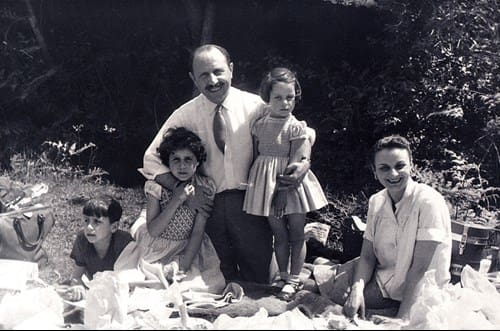
A History of Hospitality
Treating guests differently because they’re individuals was something I learned from my father. In turn, his approach to customers was shaped by working alongside his father, my grandfather. I’m fortunate to have been born into a family that has had hospitality and entrepreneurship at its heart for generations, and this experience has shaped Rocco Forte Hotels.
My family’s story in hospitality begins in 1911. That was the year my grandfather made the journey from Monforte, a hamlet in the South of Italy, to just outside Fife in Scotland. Not long after, he founded a café called The Savoy, the first Forte hospitality business.
After seeing my grandfather open and run a number of successful restaurants in both Scotland and England, my father set up a Milk bar on Regent Street. His timing was perfect. It quickly became one of five in central London and these grew to become the Forte hotel and restaurant business, later known as Trusthouse Forte, which went on to become the largest hospitality group in the world.
Learning the Business
As you can imagine, I grew up in and around hotels. From the age of 14 or 15, I had holiday jobs working in different parts of the business including customer service, kitchen work and housekeeping. I experienced as many different departments as possible. As a grounding in hospitality, there really is no substitute for working with guests and finding new ways to engage them. There’s nothing worse than an unnatural or programmed interaction, with greeted guests being asked exactly the same questions by different staff members within minutes of each other. Improving customer interaction has been a priority for Rocco Forte Hotels from the beginning and we’re developing programmes that will enable us to get better and better at this.
My industry education continued after Oxford and qualifying as a chartered accountant. I took over the running of a 40-bedroom hotel in the south of France. And while I didn’t sleep much that year, I learned a great deal about the drive and imagination it takes to run a successful hospitality business and I’m proud to say that was the only year the hotel made a profit.
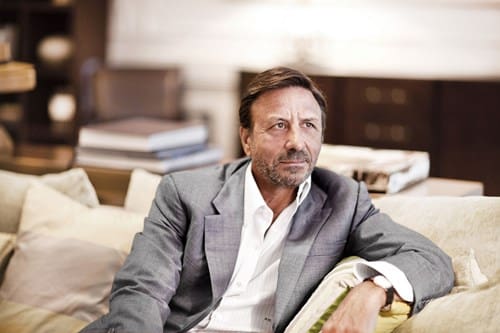
In the Beginning
We had a very clear strategy and vision for the business. We made a decision to focus on luxury properties in major continental cities and to build a reputation for attentive, non-intrusive service. From the outset, we knew the business we wanted to become. All our hotels would be run independently rather than as a chain operation. All of them would capture a unique sense of place, thanks to my sister, Olga Polizzi, who is the group’s co-founder and our Director of Design. And all would reflect a strong family influence – a powerful force in any business. And twenty years on, we have been true to this vision as these are still the qualities that differentiate us from other hotel companies.
My first hotel was The Balmoral in Edinburgh, and you can see all these differentiating strands are still in place today. The hotel has a particular place in my heart, partly because it was where the story all began, but also because it is a part of the fabric of the city.
Twenty Years of Growth
Our ambition has never been to be the largest luxury hotel business, or to run the largest hotels. When a hotel reaches a certain size it loses its intimacy and sense of personality. I believe it’s a far more rewarding experience to stay in a smaller hotel where they know your name and your favourite room, rather than an impersonal tower block. Equally, it is only possible to capture the spirit of different cities in a hotel collection: this individuality is always lost in hotel chains.
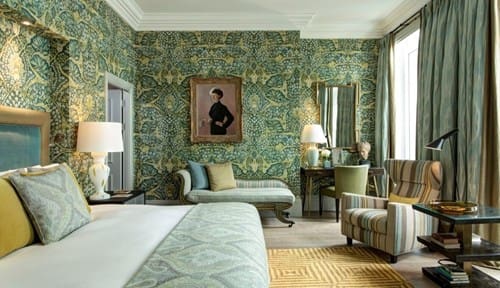
These principles have served us well and over the last two decades we have expanded from a single hotel to a collection of 11 mainly concentrated in major European cities. Today Rocco Forte Hotels numbers some of the finest hotels on the continent, including the Astoria in St Petersburg, whose Astoria Restaurant is a city institution, Brown’s, the oldest hotel in London and the beautiful Hotel de Russie in Rome, my wife’s home city.
Our resort in Verdura in Sicily is one of my preferred escape destinations because it perfectly blends indulgence with a little wilderness, but each one of the hotels in the collection has its own magic. I can’t choose between them: they are like children to me. And I feel blessed that I’ve been able to collect and curate such an exceptional group.
Not that we are content to stop at 11. We have ambitious plans to grow the group.
Thinking Further Afield
In the next five years, we intend to become a 15-strong group, adding to it in Europe and elsewhere. Italy is a particular focus as the country still has so much potential as a luxury destination and it is written into my family history. Our first step there will be to open a second hotel in Rome in 2018: the Hotel de la Ville, which is magnificently positioned at the top of the Spanish Steps.
In the same year, we will also be unveiling our first hotel in Asia. We haven’t settled on a name yet, but the Rocco Forte Hotel in Shanghai will sit along the XuHui Riverside amongst the beautifully landscaped grounds of this newly created district. Guests will have fantastic views of the city, distinctive Rocco Forte Spa treatments and the sense of place that all our hotels share.
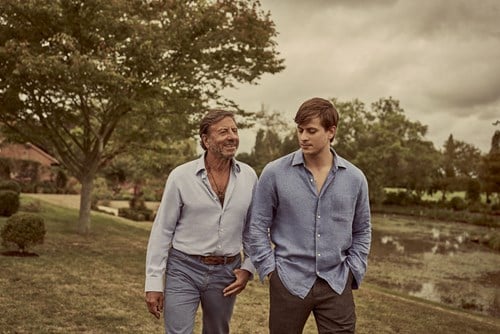
Looking Ahead
To my mind, how we succeed is as important as what we achieve. My father instilled in me a deep sense of integrity and this runs through everything we do at Rocco Forte Hotels. We believe it is important to treat your people, partners and suppliers as well as you treat your guests. Not only is it the fair and correct thing to do, but it also makes business sense.
People who work in hospitality have to enjoy what they’re doing because that is communicated directly to customers. So we work hard to create an atmosphere they enjoy, to train and develop them properly and give them opportunities to progress. We have always done this, but today we’re using new technology to help us and have recently developed an app – Map my Future – that helps them plan a career path through the business.
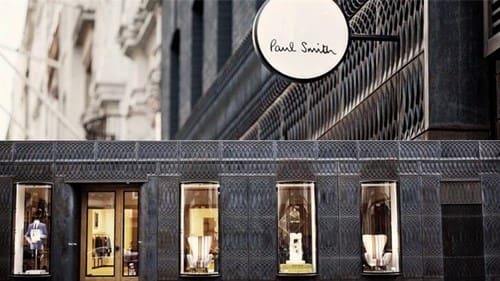
A Family Business
Our people are an amazing source of new ideas and energy into the business. This can come from anywhere, but from a personal perspective I am very proud of the new thinking and energy that my children bring to the business. Now both my daughters and my son work with us, with Lydia focusing on our food and beverage offering and Irene on our brand, service standards and our distinctive spa proposition. I love the millennial perspectives and new innovations they bring us, including Forte Organics, an organic product brand made in Italy exclusively for our spas.
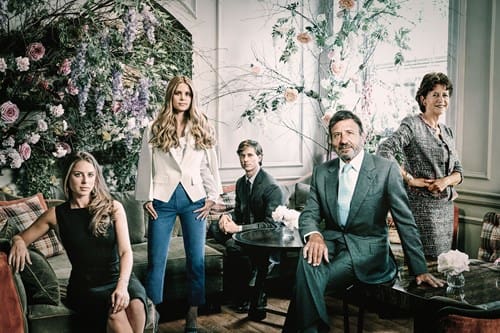
I’ve had the immense pleasure of working closely with my sister, Olga, from day one. She has shaped every aspect of our distinctive design philosophy and is leading new collaborations with Tommaso Zifer, Martin Brudnizki and other celebrated designers. But now the Forte family influence isn’t just confined to the two of us, and with so many family members actively involved it’s felt throughout the business. We are in each of the hotels regularly, so the staff hear from us directly and our philosophy and way of doing things are ever-present.
That’s not to under-estimate the depth of expertise in the business outside the family. We have some of the most talented and experienced managers in hospitality working with us, and just recently brought on board Maurizio Saccani, as Director of Operations. One of the attractions of the Group for hoteliers is that our General Managers enjoy a great deal of autonomy. They benefit from excellent support from our central finance, marketing and HR functions, but are encouraged to bring their own ideas to their hotels. That’s an attractive proposition for enterprising hospitality professionals as they’re able to shape our growth.
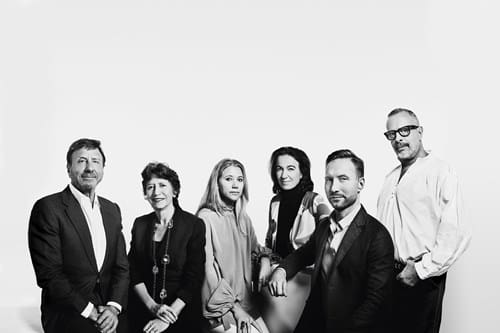
Technology and the future
I started by saying that personalisation is going to be the future of luxury hotels and I’d like to return to that theme to end. First, it’s important to note that there isn’t a simple definition of luxury. Luxury is a purely personal affair: it’s in the eye of the beholder. That’s why it’s so important that you need to get to know your guests well as a hotelier.
New digital technologies and the data they generate has added another dimension to the art of getting to know guests and anticipating their needs. As an industry, we can map how often guests visit, which services they use, how they like to communicate, where they like to eat and many other things. And technology means it’s now possible to give guests a personal experience that’s closer to their purely individual idea of luxury. There are apps to enable guests to customise their mini-bar before their visit. Equally, technology means it’s now possible to set your own personal preference for lighting and temperature levels, open your curtains automatically and check-in online if you wish.
Clearly, personalisation is going to reach a whole new level in our sector. As a business that’s always kept pace with technological change, we will embrace all its potential. However, it is worth striking a note of caution. New trends and technological developments should never overshadow or replace the personal touch and influence that is at the heart of exceptional service. This one-to-one interaction is key. And getting this right and making a connection with people is perhaps the single most important reason guests return again and again and the business grows.
There’s a simple way of summing up the personalised service and experiences that are at the heart of all our plans for the future:
“Something different. Something special. Something unique.”







